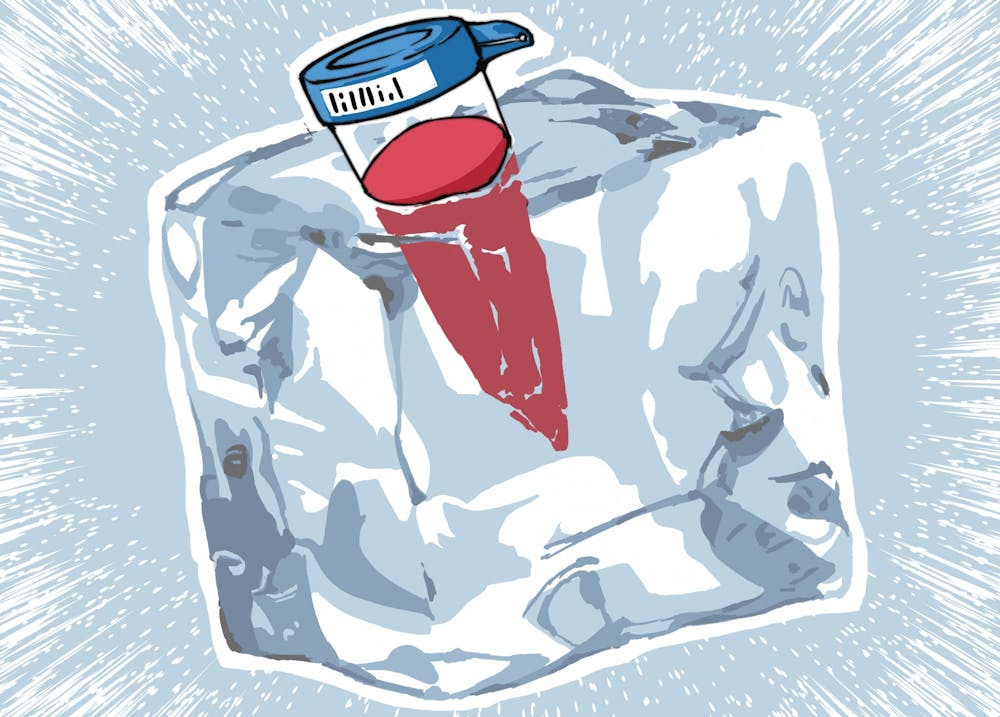A section of ASU's Alameda Building, which houses the ASU Natural History Collections, is being renovated to provide a new area for a biocollection named the NEON Biorepository.
Nico Franz, a professor and principal investigator for the NEON Biorepository, said the project required additional cryogenic collections space, the reason behind the renovations. The new space will store ecological samples, including water, dirt and plant or animal cells.
The biorepository houses thousands of biological samples with the support of a 30 year grant from the National Science Foundation given to the University in 2018. The grant is projected to provide $35 million over the 30 year funding period after beginning with $4.1 million at the start of the project.
The NSF's National Ecological Observatory Network, or NEON, is a research project with 81 locations across the U.S., including Hawaii, Puerto Rico and Alaska. The facilities collect long-term, open access ecological data to observe changes to U.S. ecosystems.
"They are sampling about 60 or 70 different kinds of biological organismal and environmental samples at these 81 field sites," Franz said. "There was a need for a biorepository to observe that sample volume on a yearly basis for 30 years and make it available for other researchers."
Azhar Husain, a research specialist and cryogenic collections manager with the biorepository, said the samples they have collected thus far have been housed in an interim space for the last year and a half.
According to Franz, this project is larger than usual for the NSF in terms of investment, geographic scope and duration.
"We are part of, in a certain sense, a research facilitating infrastructure," Franz said. "I do feel the success of the infrastructure or the validation is going to come in more use."
Franz said a research team at the University of Oklahoma used some of the biorepository's samples to apply the findings of German research on insect loss to local ecosystems. Loss of insects adversely impacts ecosystem functioning, as insects play a central role in pollination and providing a food source for birds, mammals and amphibians.
Franz said the biorepository focuses on sampling to observe long-term changes to ecosystems, such as abundance and locality of a species. Studying multiple samples simultaneously demonstrates the environmental changes' effects on different kinds of organisms, according to Franz.
“In order to understand the complexity of the ecological responses to environmental change, you have to go broader than just one sample group,” Franz said.
Franz said the studies on environmental change in Arizona aren't universally applicable, but the project's goal is to collect a large foundation of data.
“The NEON project is supposed to address a broad subset of the entire community across different regions and at different time slices,” Franz said.
Franz said he feels good about the project and hopes to make biological collections useful for modern day, socially relevant ecological research.
“These are samples that are supposed to be used in order to learn about our environment. I think that also reflects positively on us in terms of being a research infrastructure and a research resource that is accessible and is being accessed,” said Franz.
The biorepository currently has four liquid nitrogen freezers and 15 mechanical freezers, according to Husain. Each freezer is maintained at strict temperatures to protect genetic information of biological samples.
The biorepository normally accepts student volunteers but has halted hiring during the pandemic. Franz said there are 10 undergraduate students, some graduate students and few researchers working with his research team.
Husain said he has one undergraduate student, Ana Castro, working on his management team.
"We're always hiring students here," said Husain. "We're just coming back online after COVID and after finishing these renovations and bringing the equipment in. We will be hiring in the coming weeks.”
Castro, a biomedical sciences major and research aide for the biorepository, said working inventory management for the biorepository has given her a head start in research.
“We have been working on transferring a lot of the samples from low-temperature freezers into a vat of liquid nitrogen," Castro said. "That's been pretty fun and pretty interesting to do.”
Reach the reporter at Lizbet.Flores@asu.edu and follow @florelizbet on Twitter.
Like The State Press on Facebook and follow @statepress on Twitter.




